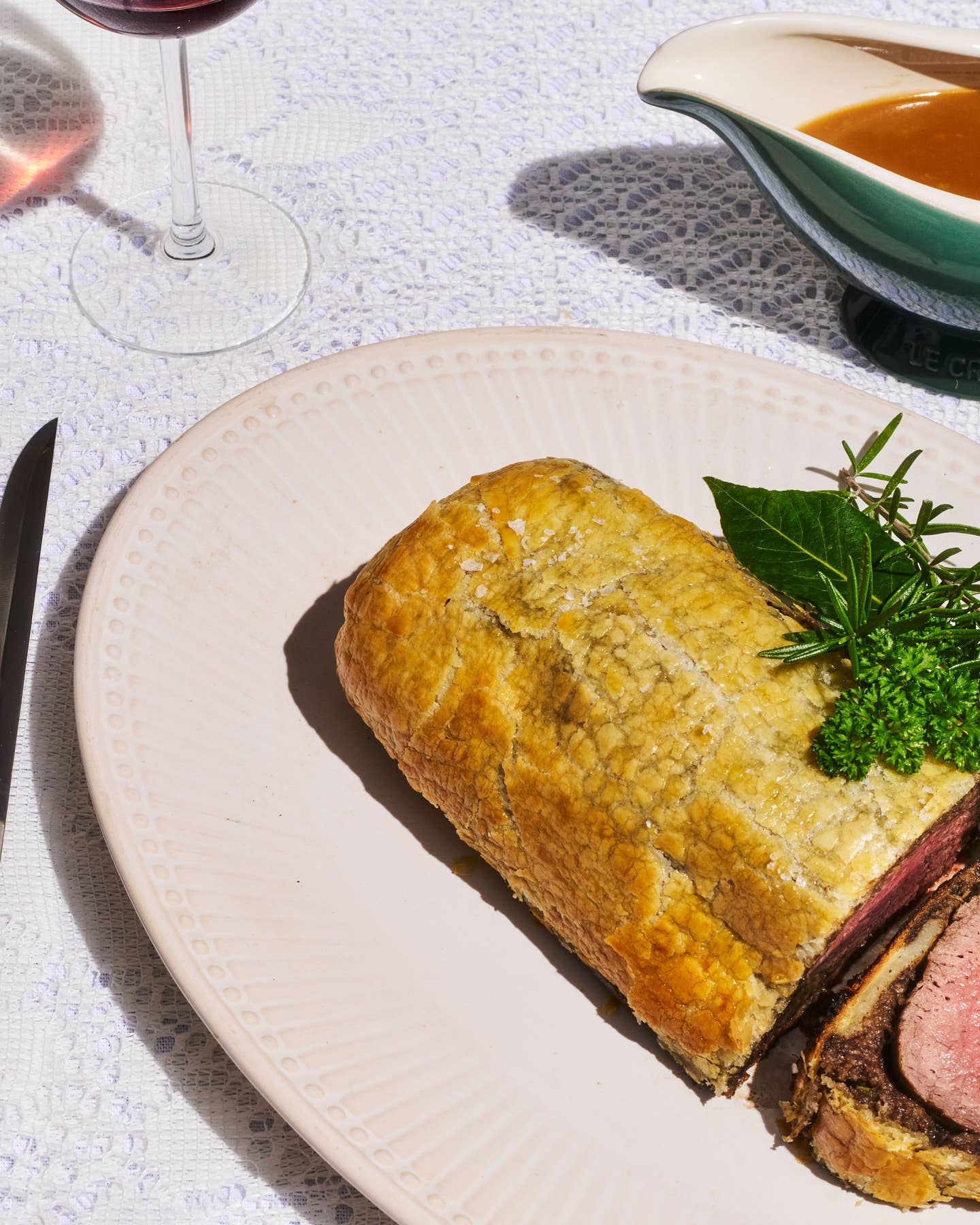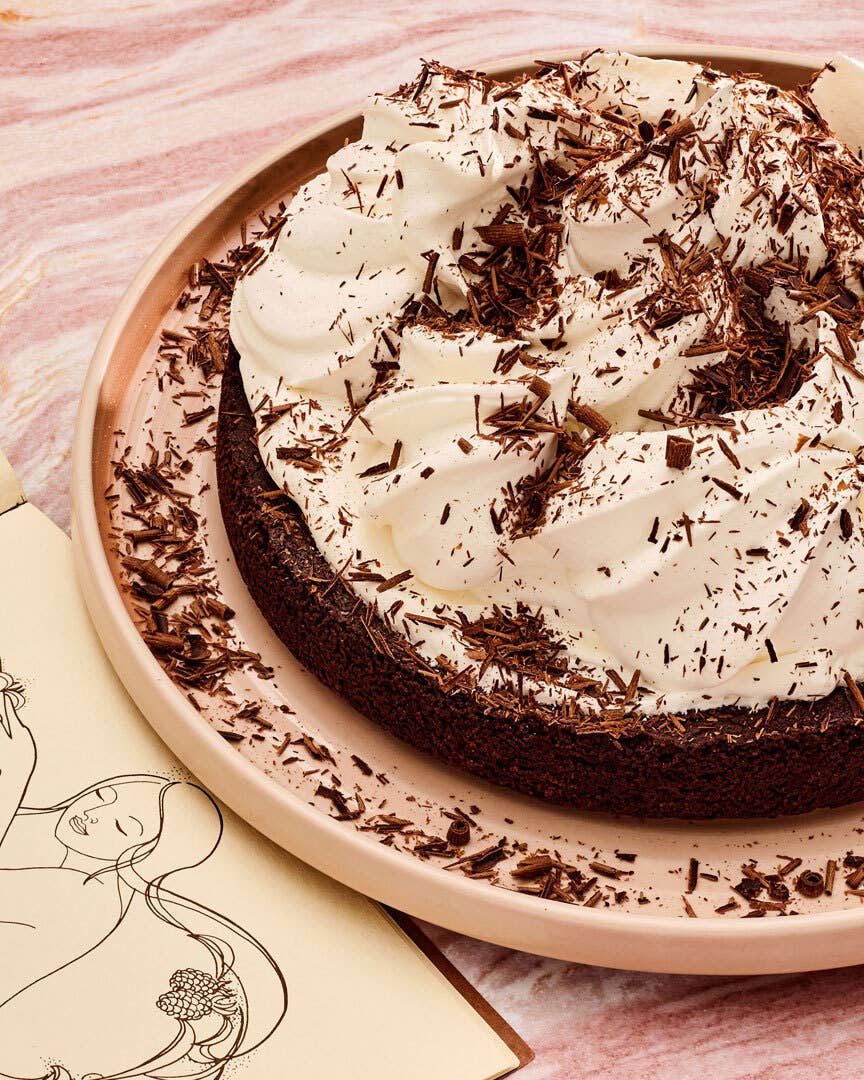
The Queen of Lima Beans
Some folks think this oft-maligned vegetable is pretty terrific. They’re right.
I don't cook them, I don't eat them, I don't buy them, I don't even like them—so what am I doing one Saturday in October, careening down the turnpike in a mid-size Hertzmobile at the ungodly hour of 6:30 a.m., heading for the 9th Annual National Lima Bean Festival in West Cape May, New Jersey?
Well, I have been invited to a lot of fascinating places in my life, but this was a first: the opportunity to spend a whole day paying homage to the legume that made succotash what it is today. I wasn't the only one excited about the prospect. "You're going where?" my jealous friends asked, incredulously. I'm surprised Ivana didn't try to wrangle an invitation.
As with Woodstock, you wouldn't want go to an event like this by yourself. My partner in the caper—in fact, the person who had invited me in the first place—was Sheila Lukins, co-founder of the Silver Palate empire. Sheila had zeroed in on West Cape May as prime lima territory in researching a new cookbook, an encyclopedic American counterpart to her best-seller, Sheila Lukins All Around The World Cookbook (Workman Publishing, 1994).
As we sped along the turnpike, I shared with Sheila my vision of how a lima bean festival should look: The sun is rising as we pull up beside a huge field filled with handsome men and women who could have modeled for Grant Wood. Happy apple-cheeked children run around in their Sunday best. On the bandstand, the local high school marching band plays "Seventy-Six Trombones." At the edge of the field, a number of 1950s pickup trucks are parked. The drivers are lima bean farmers, bronzed and strapping men cheerfully unloading bushel baskets of impossibly dewy beans for the womenfolk to cook up. The farmers all look like Gary Cooper and Sam Shepard. We are tempted to leave our husbands, but reason and guilt prevail.
In fact, we pulled up to a small, nondescript town park. At first glance, the scene suggested a generic flea market; the air was filled with the smell of deep-fried funnel cakes. No pickup trucks, no Sam Shepard, no beans, lima or otherwise. "Excuse me," Sheila called out to a woman selling antique dresses. "We're looking for Wilbraham Park. The Lima Bean Festival?" "This is it," the woman replied, gesturing down the three-block-long row of booths.
Perhaps I had romanticized the festival a bit. A lot. Totally. More than a little discouraged, we were walking past the tables selling antique postcards, marcasite stickpins, and World's Fair coasters, when suddenly Sheila said, "What's that smell?" That smell was a sort of mirage, an oasis, a miracle: It came from a small booth staffed by small vendors selling homemade lima bean soup. Very small vendors. The second-graders from the West Cape May Elementary School had, with their teacher's help, done it all, from helping to pick and shell the fresh beans to making the soup and selling it. Their rich, creamy soup was so thick with limas and vegetables that it was almost a chowder. One taste, and I was hooked. Fordhooked, as it turns out, Fordhook being the lima variety that is grown and harvested locally.
As Sheila and I continued down the brick path, we discovered that for every booth selling used sweaters, sweet potato pie, or pink lemonade, there was one selling lima beans in some form. In rapid order, we were ordering more lima bean soup (this time from the second-graders at the Carl T. Mitnick School); lima casserole from the Four Seasons Market; stewed lima beans from the West Cape May–Cape May Point Republican Club ("We're nonpartisan when it comes to beans," said a club official); succotash from the Kiwanis Club; and puréed lima and ham soup from the local PTA. "Are you sick of lima beans?" I asked Margaret Kealy, the gracious PTA woman who was spooning soup from a huge vat into our styrofoam cups. "Oh, yes!" she replied sweetly.
Sick of limas? Not us! Not when they tasted like this, in all their infinitely surprising freshness and wondrous variety. I asked Sheila what made these limas so clearly superior to the soggy gray-green beans that my mother cooked and that even the dog hesitated to accept. "Maybe," suggested Sheila, "the word 'cooked' isn't accurate. When we were growing up, you never saw fresh beans. They always came in those boxes, frozen. They just boiled themselves to death in a pot of water and wound up in a little clump next to the meat loaf on your dinner plate. This is a bean that has never been given the loving care it deserves."
Well, talk about overcompensation! I am convinced that, with one bite of just about anything at the festival, people who have politely said "None for me" to limas all their lives would find themselves limaholics.
My own conversion to bean cuisine came (where else?) at the American Methodist Episcopal Church booth. Three elegant women were serving stewed lima beans, baked lima bean casserole, and barbecued chicken with tangy barbecued lima beans. By this time, Sheila and I had gone from sampling and tasting to wolfing and gobbling.
We weren't the only ones caught up in the spirit of the event. "I'd heard how good this festival was," raved a woman behind me. "Right," replied her friend. "There's no question. This is the festival of West Cape May."
I don't know much about lima bean art, but I know what I like. And since this was a special kind of day, the kind of day where you'd want to take home more than just memories and a good case of indigestion, I found myself loaded up with lima T-shirts, lima magnets, and two local cookbooks featuring everything from lima pâté to Key lima pie.
If you're thinking, It can't get any better than this, I've got news: It did. We were introduced to The Honorable John Vasser Jr., mayor of West Cape May, whose family has long farmed limas in the area. He told us how the festival got started: One day, back in l983, the local civic association started looking for a community project. After much soul-searching, someone said, "The biggest thing we got going is beans." Two years later, the festival, to be celebrated the first Saturday in October, was created.
Is West Cape May really the Lima Bean Capital of the World, as town officials boast? Probably not. But, as Sheila said, "Who cares? Any place that has all these limas and this much civic pride deserves to be the lima capital of the world."
Then it was time for the two biggest events of the day: the Lima Bean Toss and the crowning of the Lima Bean Queen. We watched in awe as athletes competed to see who could throw the most beans out of 12 across a line of gaffer's tape into little styrofoam cups. Then came the moment we had all been waiting for: the Coronation.
Ms. Lima Bean is chosen in a manner that I believe the Miss America Pageant would do well to emulate. To enter, you write your name on a piece of paper, put it in a shoebox, and hope you get picked. I was longing to enter myself, but felt that the commitment, should I win, might be too much. In addition to riding in the Christmas parade, you have to be available for the Fourth of July fireworks.
Imagine our amazement, then, when Mayor Vasser asked Sheila if she would pick the winner. Would she indeed! Sheila put down her tomato–lima soup just long enough to make a touching speech in which she said that this was the greatest honor that she had been accorded in years. Then, to a drum roll from the band, she read out the name: Ashley Ruberti, an 8-year-old Snow White look-alike who was crowned with a faux-rhinestone tiara and given a green hooded lima bean sweatshirt.
"I've been to the Dandelion Festival in Vineland," said the man next to me, "and it's got nothing on this." Who could disagree? The humble Fordhook had had quite a day, and was surely the envy of pinto beans, string beans, and kidney beans everywhere.
"Come on, Sheila," I said at last. "It's time to go home." So, 10 hours after setting out, we waddled back to the car, got in, unwrapped the barbecued pork sandwiches, coleslaw, and curly french fries we'd bought in case we got hungry on the ride home, and headed for the turnpike.
"What did you think?" I asked Sheila. "I thought this festival was just incredible," she replied. "I know it sounds corny, but this kind of thing is what America means to me—small-town people who really care about each other. It was one of the most wonderful things I've done in my life." She paused, then added, "Could you pass me half a barbecued pork sandwich? I'm starving."
Keep Reading
Continue to Next Story










